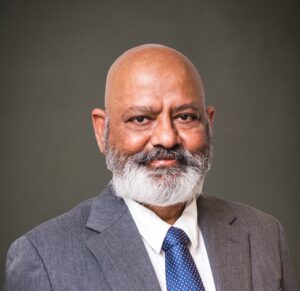At the CCC, our mission is to standardize the connected ecosystem around vehicles and devices with solutions that combine convenience, security, and privacy protections. As vehicle connectivity continues to evolve, setting global standards and fostering collaboration across industries has never been more important.
To further our commitment to innovation and leadership in this space, we’re excited to welcome Ganesh Venkatesan as our new Technical Director. With over 30 years of experience in wireless networking, embedded systems, protocol development, and driving adoption of critical industry specifications, Ganesh brings a wealth of expertise and insight to the CCC.
We sat down with Ganesh to learn more about his background, his vision for the future of connected vehicles, his goals in this new role, and his very enthusiastic dog. See our interview with him below:
Why did you join the CCC?
CCC provides a unique opportunity to collaborate with experts in developing solutions that relieve users from trivial tasks, making their lives simple and safe. For example, it would be wonderful to park your car and walk away, leaving technology to take care of shutting down and locking the car. I am passionate about delivering such solutions.
What unique perspectives or expertise do you bring to the CCC as the Technical Director?
I am optimistic about technology making us superhumans. Standards bodies play a vital role in that evolution. I have the benefit of having worked with various standards organizations over many years, bringing experts from different companies to work toward common goals in developing win-win solutions. I understand how standards bodies work and how to get the most out of member collaborations.
What goals do you have for the CCC in your new role?
I plan to work with the team and empower our Members to enhance the digital key technology with more features addressing real-world requirements with open standards, such as fleet management use cases and support for optimized yet more secure cryptography.
Why do you feel a standard like CCC Digital Key ™ is important to the automotive industry?
Security is paramount, and CCC Digital Key™ provides security using a standardized protocol. CCC Digital Key also lays the foundation over which other automotive use cases can be enabled. For instance, the communication link between the car and the user device can function as an extension of the owner’s senses, facilitating remote monitoring of what is happening in and around the car while the owner is away.
How have you helped drive the adoption of critical specifications throughout your career?
I have contributed to various features in the IEEE802.11 specification, to Wi-Fi Alliance technical specifications, and lately, to IEEE802.1 Time-Sensitive Networking protocols. I have been with standard development since 2005.
What’s most exciting to you about connected technology in the automotive industry?
If you (as the owner/renter of the vehicle) are securely connected to the vehicle, you can monitor your vehicle from anywhere and be notified if any of the preset thresholds are breached. This is what I mean by superhuman capability. CCC Digital Key enables this at a fundamental level and has a lot of scope for extending the feature set, including interacting with other networks in the vehicle. That is what excites me.
Is there anything that might surprise consumers about vehicle connectivity or an area or development you think they should know more about?
Whitepapers on the robustness of the security of CCC Digital Key™ may be useful to consumers. I think with the advancement of technology, consumers already expect the features that vehicle connectivity provides. The surprise for the consumers, in my opinion, will be that their wish or dream is already real.
What are some of the key considerations in promoting the adoption of connected car standards, and how do you approach them?
Rendering the standards customizable for geographical and governmental needs while keeping the core security features uncompromised is important. In some situations, optimizing the protocol to enable newer use cases is key. Adoption can be accelerated by creating awareness using webinars, whitepapers, workshops, etc., with end-users and OEMs as the primary audience. End-user demand for solutions will incentivize OEMs to implement and deploy solutions.
Where do you see the industry heading in the next 5-10 years?
I recently read “The Singularity is Nearer” and fully subscribe to the ideas presented there around how technology will vastly increase human intelligence and improve our lives. With connectivity and compute becoming ubiquitous and cheap, the possibilities are limited only by our imagination, or lack of willingness to collaborate for collective enrichment. I envision the scenario where you can “tell” your wish to your car, or better yet, your car “knows” your wish.
What do you want CCC Members to know about your role?
I am here to facilitate collaboration between the experts for the success of the CCC and each of its Members. I will be a conduit in providing all possible mechanisms to render our specifications to be robust, participate in all activities to complete our projects on time, enable adoption of our technology by bringing it to potential audiences (in the form of whitepapers, webinars, workshops, etc.), and help resolve any issues that are identified as potential roadblocks to our progress.
To end on a lighter note, tell us about your dog.
My family has a golden-doodle, Phoebe. She is 7 years old but still behaves like a puppy. Here’s a photo of her:

________
We’re excited to see what Ganesh accomplishes as the CCC’s Technical Director. If you’re interested in learning more about how to get involved with the CCC, please visit https://carconnectivity.org/becoming-a-member.
Ganesh Venkatesan, CCC’s Technical Director
